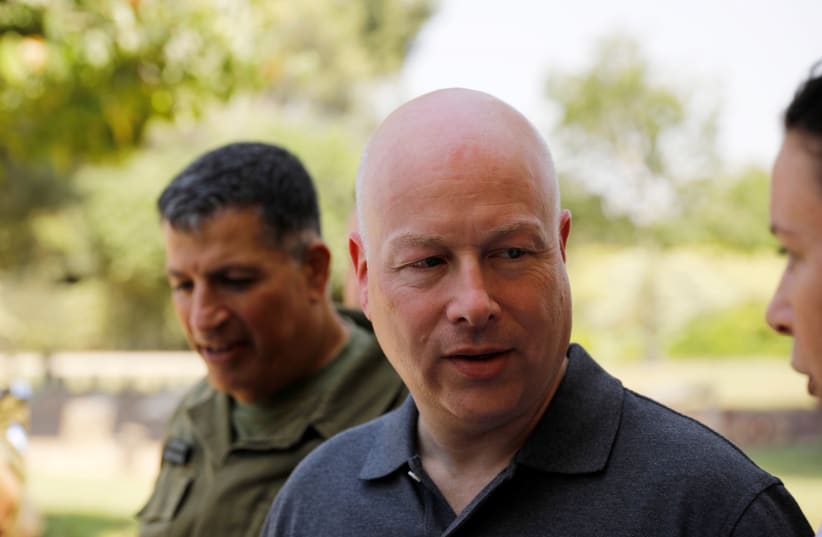It is not the first time that the administration has clarified that these rumors are false. During October 2018, senior administration officials told The Jerusalem Post that the plan would not include a confederation with Jordan.Over the past summer, Palestinian Authority President Mahmoud Abbas claimed that the US team had floated the idea directly with him, and suggested the proposal was at the heart of their peace plan. But US officials told the Post at that point that the administration has not even considered a confederation since the very beginning of their deliberative process more than a year ago.Greenblatt’s comments came as part of a series of written attacks the special envoy has launched against the Palestinian leadership in both the West Bank and Gaza in past weeks, particularly on social media.Greenblatt wrote an opinion piece published in The New York Times on Tuesday which said that Hamas, not Israel, is responsible for the miserable conditions in Gaza.The international community, including the United Nations and the European Union, has largely held Israel responsible for the humanitarian and environmental crises faced by the two million Palestinians living in the Hamas-ruled enclave.“If you ask why such hardships exist in Gaza, the answer will almost always be the same: the Israelis,” Greenblatt wrote. “Really?” he continued, taking issue with this standard assertion.He noted that Israeli-Arabs who are citizens of Israel and Palestinians living in the West Bank are not facing the same crisis as Gazans.“Why are others moving forward while Gaza sinks further into despair and disrepair?” he asked. “Because Hamas, the de facto ruler of the Gaza Strip, has made choices. Hamas professes violence and the destruction of Israel as a method of gaining a better life for Palestinians.”International donations to reconstruct homes, schools and hospitals have been diverted to military use, with concrete going to build tunnels, water pipes for rockets and bottling chemicals for rocket fuel, Greenblatt described.“Hamas is to blame for Gaza’s situation,” he said.Greenblatt also noted the three wars against Israel in the last 12 years – all waged by Hamas – since they seized power in Gaza in a bloody coup.In each war, Hamas and other terror groups attacked Israel with thousands of rockets and left Gaza in disarray, Greenblatt wrote.In response to the Gaza violence, Israel has adopted “more restrictive measures on imports to Gaza to prevent the illicit transfer of goods that could be used to build and expand the militants’ arsenals,” he continued.Hamas has also clamped down on Palestinian protesters against its rule, with “vicious beatings and torture,” Greenblatt explained. “Hamas has driven the people of Gaza into lives of misery in a bid to stay in power. A recognition of its dismal failure and an honest assessment of reality could pave the way to reconnect Gaza to the world that wants to help.”Greenblatt said that the United States did not cause the problem in Gaza nor can it fix it without cooperation from Hamas. He said that whether or not a comprehensive peace agreement between Israel and the Palestinians is achieved, the future of Gaza cannot be addressed and the people of Gaza cannot be helped in any meaningful way until Hamas is no longer in the picture or makes the necessary choices for stability and, eventually, peace.“To achieve peace – or even some normalcy – in Gaza, Hamas and others must make hard choices, including renouncing violence and recognizing Israel,” he wrote. “Imagine if Hamas put the people of Gaza first. Imagine if Hamas chose peace.”Greenblatt followed that opinion later in the day, with a tweet accompanied by a graphic showing the different types of rockets Palestinians in Gaza have launched against Israel.“Why do we keep stressing the importance of Israel’s security?” Greenblatt wrote in the tweet. “This graphic gives one important example. Almost every major city in Israel is in Hamas’ rocket range, and they’ve proven their willingness to use them. Hamas’ terror is just one of the many very real threats to Israel.”.@KingAbdullahII & #Jordan are strong US allies. Rumors that our peace vision includes a confederation between Jordan, Israel & the PA, or that the vision contemplates making Jordan the homeland for Palestinians, are incorrect. Please don’t spread rumors.
— Jason D. Greenblatt (@jdgreenblatt45) April 24, 2019
Greenblatt: Upcoming peace plan doesn't include confederation with Jordan
"Please don’t spread rumors."
